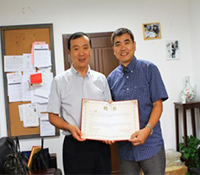
Qualcomm Institute and CineGrid Representative to Speak at China Animation Academy Awards Conference
By:
- Tiffany Fox
Published Date
By:
- Tiffany Fox
Share This:
Article Content

From left Sun Lijun and Qian Liu
Qian Liu, a Visualization System Integrator at the University of California, San Diego’s Qualcomm Institute, has been invited to speak at the China Animation Institute of the Beijing Film Academy’s 13th Annual Academy Awards Conference, which begins Friday and ends Nov. 12.
The China Animation Institute invited Liu to participate in the event after his presentation in Beijing last month on CineGrid, a non-profit international membership organization focused on the research, development and demonstration of networked collaboration tools for digital cinema. The China Animation Institute has announced its intent to join CineGrid at the Gold membership level, which will provide it access to the full suite of CineGrid tools. Such tools – including CineGrid Exchange, a film library of clips that offers 4K technology, which is more than four times the resolution of high-definition television -- enable the production, use and exchange of very high-quality digital media over high-speed photonic networks.
CineGrid was incubated at the Qualcomm Institute, which is the UC San Diego division of the California Institute for Telecommunications and Information Technology (Calit2). It is now overseen by California-based Pacific Interface, Inc.
The Academy’s Award Conference -- an open international competition mainly focused on animation -- will feature not only distinguished guests from the movie industry but also investors and representatives from Chinese universities. Liu will speak about digital multimedia and display applications over high-speed photonic network.
Liu, who is director of CineGrid Exchange Operations, said the addition of the Academy to the CineGrid membership will “kickstart China’s research into 4K technology and university teaching and signify that they want to be fully involved.”
“CineGrid is not only a membership-based organization, it’s really a research-intensive collaboration,” added Liu, who noted that the members of CineGrid include Calit2, NTT, Disney, SONY, JVC, Panasonic, CESNET and other companies and academic institutes around the world.
“The members of CineGrid have many point-to-point collaborations throughout the year -- it’s not just a single conference,” he noted. “It’s not the kind of organization where you pay membership and get a newsletter. Our organization is much more than that.”
Following its admission to CineGrid, the Academy will gain access to CineGrid’s library of experimental 4K movie clips and will be invited to host one of the CineGrid servers, which are currently located at Calit2, the University of Amsterdam, Prague (which is overseen by the Czech Education and Scientific Network, or CESNET), Japan’s Keio University, the University of Illinois at Chicago, the Naval Postgraduate School in Monterey, Calif., and the Academy of Motion Picture Arts and Sciences in Los Angeles.
The network of CineGrid Exchange servers furthers CineGrid’s mission of building an interdisciplinary community focused on the research, development and demonstration of networked collaborative tools, enabling the production, use and exchange of very high-quality digital media over high-speed photonic networks.
“With a network of international servers, the distribution of 4K contents among the CineGrid members will be easy, fast ,efficient and secure. ” said Liu. “This is also another way to back-up the files. If a disaster happens in one geographic area, we don’t lose those assets – we have copies throughout the world.”
Liu, who is a native of China, notes that although many of China’s consumer products with 4K support are appearing on market, the country currently lacks any 4K research initiatives.
“China is a big country but until now they didn’t have a representative in CineGrid, so it’s beneficial for everyone involved to collaborate on research,” he added. “It seems like we’re at the point where everything will happen very quickly now -- the hardware is ready, which will drive more people to buy 4K TV/monitors, which will drop the price and get more people interested in doing 4K research.” Liu noted that Blackmagic Design, an electronics company, have released the world’s most portable 4K digital film camera under $4,000.
New, less expensive tools and increased international collaboration are the keys to advancing and deploying new movie technologies and deciding the near future 4K movie or television standards, said Liu.
“We’re always looking for more partners. This will be a joint effort of the whole world.”
Share This:
You May Also Like
Stay in the Know
Keep up with all the latest from UC San Diego. Subscribe to the newsletter today.


